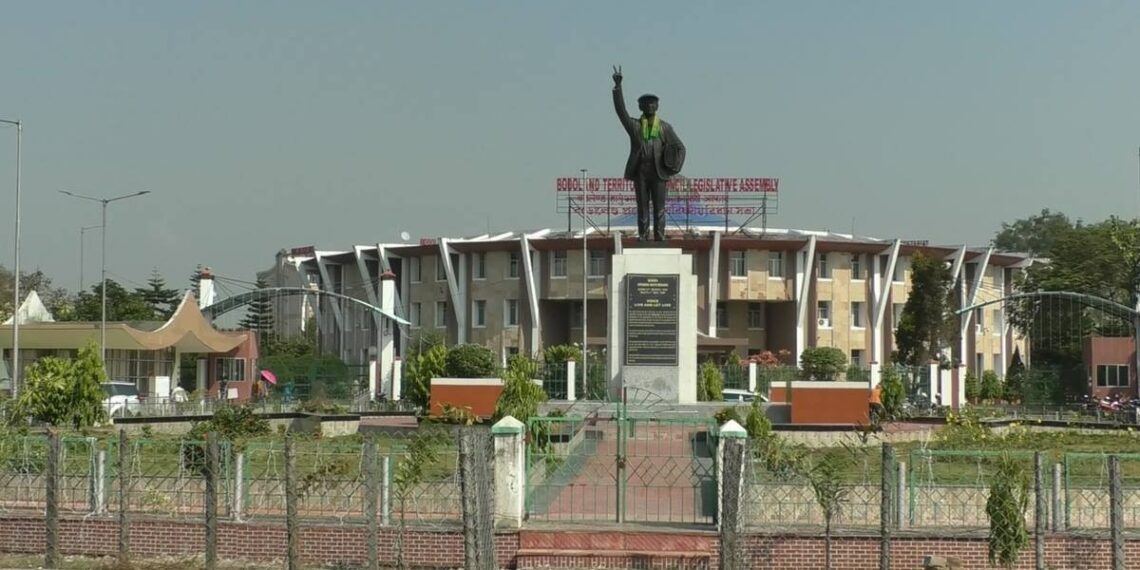In a move to reclaim the greatness of Indian civilization as a developed and prosperous nation among all nations of the world, Prime Minister Modi Ji has already sounded the conch and given the clarion call: “Vikshit Bharat @ 2047!”
This visionary call invites the widest participation from all institutions, organizations, and individuals to redeem the greatness of Bharat.
It serves as an inspiration for all citizens of the country to relentlessly pursue the dream of achieving a Sashakt Bharat.
It is a call for each one of us—every citizen, family, community, civil society organization, and corporate house of Bharat—to work in synchrony towards a glorious end!
Under the leadership of our Hon’ble Prime Minister Modi Ji, the Bodo Peace Accord of 2020 provided an opportune platform for establishing sustainable peace, harmony, and integrity in the Bodoland region.
It marked the end of the dark days of violence, killings, and pervasive hatred between communities.
Further, the continued guidance of Home Minister Amit Shah Ji and the hard work of Assam’s Chief Minister Karmayogi Himanta Biswa Sarma Ji have gifted the Bodoland region with the time and opportunity to rebuild, heal, and take the first steps toward lasting peace, harmony, and development!
What a privilege it is for all of us in the Bodoland region, even from the remote Indo-Bhutan border areas, to partake in this magnificent and unprecedented journey toward Vikshit Bharat @ 2047!
Earlier, the challenges faced by the people of BTR demanded a proactive and empathetic approach from policymakers.
Acknowledging the people’s grievances and aspirations was essential for fostering trust and building sustainable peace. In this context, key steps included the delivery of participatory governance, equitable development, conflict resolution mechanisms, education, and awareness, among others.
Thus, the Bodoland Territorial Region (BTR) Government initiated a participatory visioning exercise among 26 different communities residing in BTR, involving over 70 different organizations, agencies, and institutions, each spearheading and voicing their respective community’s aspirations.
By engaging with them in ways that honor relationality, respect, and dignity, this Community Vision for BTR project crystallized a collective vision that works toward acknowledging, documenting, and resolving the long-standing issues and unmet aspirations.
As part of the flagship Bodoland Happiness Mission, this initiative reflects the Council Government’s steadfast commitment to fostering sustainable peace, promoting healing, and addressing the enduring scars of over four decades of conflict and violence.
Why a community approach? Taking the ‘community’ approach was necessary because India, with its rich cultural and social diversity, thrives on the strength and unity of its communities.
Encouraging and empowering communities is vital not only for preserving this diversity but also for fostering progress and harmony within the country. Communities form the foundation of India’s identity.
From traditional practices to modern collaborations, communities embody the shared histories, values, and aspirations of their members.
Their collective spirit contributes to the vibrancy and dynamism of Indian society, making them indispensable to the nation’s progress.
It is also true that from the Stone Age to modern times, human beings have largely organized themselves into communities.
Community, as a frame of reference, made space for intensive interactions, the establishment of blood-based and kinship-based relationships, the demarcation of boundaries that provided inside-outside markers, and the growth and development of cultures, languages, mores, religions, and worldviews.
The community sustained individual and group well-being; it fostered cooperation, collaboration, and protection among its members. The group-survival principle was the integral rule.
Thus, the community best promoted and sustained distinctive languages, cultures, customs, and traditions. In contrast, modern societies generally promote individual liberty, freedom, and dignity.
These values, framed within human rights laws, have largely shaped modern nation-state governance systems. Primacy is given to individual rights and well-being from the modern society perspective.
On the other hand, individual aspirations and ambitions often give way to the community’s greater interest from the community’s perspective.
While the community zealously protects and promotes all it considers ‘its own,’ it can radically be the opposite for those considered outside its set boundaries.
Thus, history is replete with instances of community divides, conflicts, wars, and killings. Can communities co-exist? Can there be a shared culture of peace and security? Can harmony be established?
These are the fundamental questions that need to be revisited in today’s times. There is a need to revisit the common good that ‘community’ has to offer.
For instance, it is evident that the community emboldens one to survive with dignity by resisting social discrimination. The community has served as the true custodian of cultures, languages, worldviews, and epistemes.
It provides the necessary arrangements for forming institutions, agencies, and organizations to ensure that these are preserved, sustained, and promoted.
Communities are not just cultural entities; they are engines of social and economic development. Empowering them through education, resources, and opportunities enhances their ability to contribute to national progress.
A strong community fosters social cohesion, reduces inequalities, and creates an environment where every citizen can achieve their full potential.
In this way, the Community Vision for BTR is a humble yet novel initiative of our Council Government. It has been conceived in the spirit of transformation and healing—a sincere effort to understand and address the hopes, grievances, and priorities of the people.
While capturing the aspirations of the communities, the vision is an attempt to align the government’s efforts with their felt needs and unmet aspirations, thereby ensuring that every voice is heard and represented in the journey toward peace and development.
As such, it seeks to provide a guiding framework to the government and various other agencies for addressing the unique needs and collective goals of the Bodoland region, thus ensuring our steady climb toward Vikshit Bharat @ 2047!















